5 Questions with UW’s Hybrid MBA Program Director
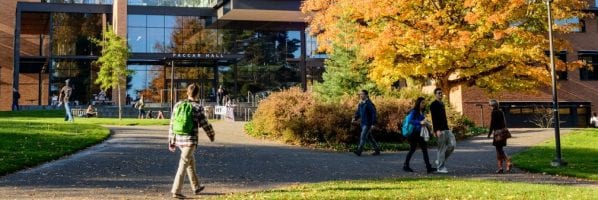
In our latest installment of the MetroMBA “5 Questions” series, we speak with Jodey Farwell, the new Director of the University Washington Foster School of Business Hybrid MBA Program. Farwell talks about the school’s rapidly growing program, what you can expect when enrolling, and Seattle’s staple brunch spot.
1.) Why Do You Believe the UW Foster Hybrid MBA is Expanding While Other MBA Programs Around the U.S. are Shrinking?
“The UW Foster Hybrid MBA program is a niche model—it’s not online and it’s not in person. It is something different, something better. Fostering a belief that we are ‘Better Together, Better Tomorrow.’
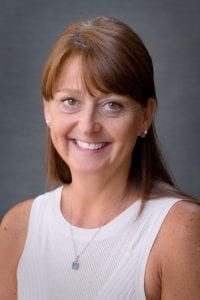
The Hybrid MBA was designed with today’s current student in mind. Want to feel connected to your classmates, professors, and university? We have quarterly immersions. Want to be challenged by world-class faculty without having to physically sit in class each week? We have dynamic synchronous ‘live’ sessions each week. Our classes are delivered with intentionality. Our curriculum design team works with faculty to break down their content in order to deliver different concepts in compelling ways from high quality, professional videos to live sessions to activities in the online course environment. Our cohort team-based program creates a tight-knit network of students located all over the US.
Our Seattle location is also attractive. Seattle has established itself as an iconic, global leader in business and innovation. For students wanting to get their foot in the door with Seattle-based companies such as Microsoft, Amazon, Expedia, and Starbucks, Foster can provide access through its expansive alumni network and rich Seattle business connections.”
2.) What is the Ideal Type of Candidate for the UW Foster Hybrid MBA Program?
“Our program is built for busy mid-career professionals. They are self-motivated, driven, and collaborative individuals looking to make an impact in their industry.”
3.) What are the Advantages of the Hybrid MBA Over Other Traditional Online MBA Programs?
“The Hybrid MBA allows you to remote into class from wherever you are the world. If you travel for work, for pleasure, or are in the midst of a move—no problem; you can continue pursuing your MBA with our program.
We are in a highly remote/telecommuting culture. If your job is remote in nature, you can be ‘live’ anywhere; the Hybrid MBA creates this same environment with its virtual classroom. This allows for some flexibility while deepening how the students value their in-person immersion sessions each quarter. When they arrive, they are ‘all in.’ This is their time to spend together and to network, with professors, and staff, and our career experts.”
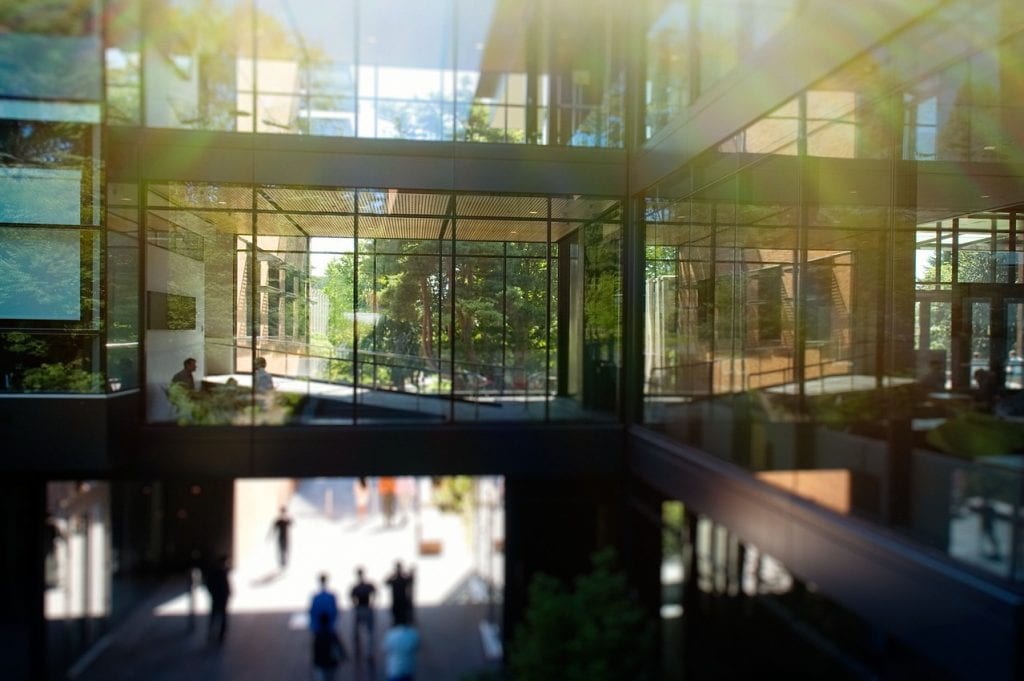
4.) How Does UW Foster Help Establish Students’ Careers with a Program that is Majority Online?
“As part of the UW Hybrid MBA, we have two career experts on staff. They offer one on one coaching, remote and in-person programming, and applicable workshops. They often bridge the gap between classroom learning and applying those concepts in your day to day- from salary negotiations, interviewing, or networking facilitation. It is our required in-person quarterly sessions, ‘Immersions’ that make these in-person components possible.
The Career Management team also offers optional treks where students can travel to key metropolitan areas to visit companies. Students visit high growth U.S. companies to experience their culture, learn about their operations and hear about potential opportunities.”
5.) For Those Visiting The School, What’s One Lunch Spot They Should Visit?
“Portage Bay is a Seattle brunch staple and there is one located on Roosevelt near UW. They serve organic dishes made from locally sourced ingredients. Portage Bay is often giving back to the community and the local farmers. Their slogan is well known and displayed proudly on all of their mugs, ‘Eat Like You Give a Damn™.’ It’s also fun to support local entrepreneurs!”
The Connection Between Social Mobility and Democracy, and More – Chicago News
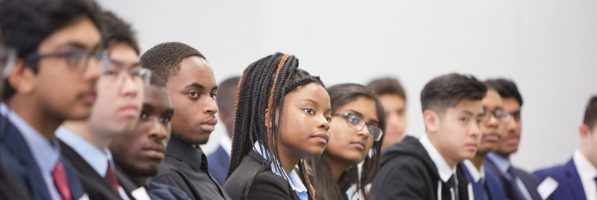
Let’s explore some of the most interesting stories that have emerged from Chicago business schools this week.
Is Social Mobility Essential to Democracy? – Kellogg Insights
Northwestern University Kellogg School of Management professor of managerial economics and decisions sciences Georgy Egorov, along with MIT Sloan’s Daron Acemoglu and Chicago Booth’s Konstantin Sonin, recently created a model to understand how voters’ beliefs about social mobility affect their political preferences.
Despite older generations becoming increasingly less optimistic with the potentially positive outcomes of future generations, the researchers find that there’s a decent probability that the children of future generations will rise to a higher economic and social class.
“Having many election cycles means that even with low mobility, the likelihood that a person’s decedents will eventually end up in another class is high. Egorov compares it to two lakes connected by a narrow straight. In the short term, they will not exchange much water. But over the long term, that small exchange will grow and grow until the waters are quite mixed.”
Speaking with Kellogg Insights, Egorov elaborated:
“In a certain sense, expectation of stability begets stability. A thick middle class makes democracy more stable than a thin one. Our research highlights the problems that may follow from a shrinking or thin middle class. Additionally, if the belief in the stability of democracy is undermined, people might well decide it’s not worth defending.”
You can read more about the trio’s research here.
Mendoza Marketing Professor Wins Research Award – Mendoza Ideas & News
The 2018 Louis W. Stern Award has officially been bestowed upon Shankar Ganesan, the John Cardinal O’Hara, C.S.C., professor of business and marketing department chair at the Notre Dame University Mendoza College of Business.
The award recognizes Ganesan, as well as co-authors Steven P. Brown of the University of Houston, Babu John Mariadoss of Washington State and Hillbun (Dixon) Ho of University of Technology Sydney for a 2010 article they published in the Journal of Marketing Research entitled, “Buffering and Amplifying Effects of Relationship Commitment in Business-to-Business Relationships.”
According to the article, “The paper examines the buffering and amplifying effects of relationship commitment on organizational buyers’ intentions to switch suppliers when a relationship is strained by the incumbent’s own misbehavior. “
Check out more from Ganesan’s research here.
The Road Ahead: Takeaways from Economic Outlook 2018 – Chicago Booth Magazine
Chicago Booth Magazine recently dove into the sold-out ‘Economic Outlook 2018’ event last January to “evaluate emerging trends [and] share their insights into the economic outlook for Wall Street and Main Street—ten years after the financial crisis.”
Randall S. Kroszner, the Chicago Booth Norman R. Bobins professor of economics, offered a few optimistic projections:
“I do think [the tax cut] is going to have a positive impact, both in the short run and the long run. I think the broad direction is fairly clear: cutting personal tax rates on a weighted average, of about three percent or so, will have positive impact on demand, because that’s going to allow for higher disposable income in the short run.”
Austan D. Goolsbee, Robert P. Gwinn professor of economics and the former chairman of the Council of Economic Advisers, offered slightly more tempered but optimistic projections as well:
“The danger areas continue to be worries about China, where there has been a big acceleration of debt, and a nagging feeling that we really don’t know what’s in the European financial institutions. That said, the overall growth around the world is looking a little better, for the first time in a little while.”
You can read more about Booth’s ‘Economic Outlook 2018’ overview here.
Why Online MBA Flexibility Really Matters

Earning an MBA, for many, can be a monumentally difficult decision. For the lucky few, their employers may provide the necessary funding to earn the degree or they already have expendable finances. For many others, though, the time and cost is just too much. However, Online MBA flexibility can help mitigate those difficult deciding factors.
SPU Makes ‘U.S. News’ Best National University List

For the first time, Seattle Pacific University made the 2017 U.S. News and World Report’s Best National Universities list. SPU is the only private university in the Pacific Northwest to appear on the list, joining the University of Washington and Washington State University as the only three universities in Washington state to rank. Continue reading…
Seattle Pacific University Ranked as a ‘Best National University’
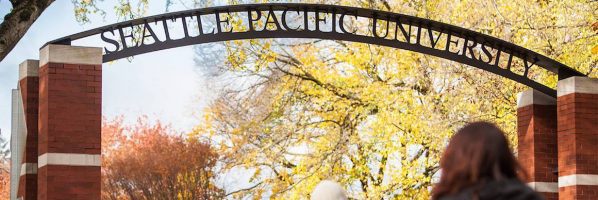
For the first time, Seattle Pacific University was ranked by the U.S. News and World Report’s Best National Universities list. 2016 was the university’s first eligible year, and Seattle Pacific was the only private university in the Pacific Northwest to make the list. The ranking was big news for SPU, which joined the University of Washington and Washington State University as the only three schools in Washington state. Continue reading…
